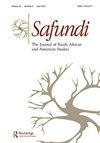Gaining currency: confession, comedy, and the economics of racial ambiguity in Trevor Noah’s Born a Crime
IF 0.2
Q4 AREA STUDIES
Safundi-The Journal of South African and American Studies
Pub Date : 2021-07-03
DOI:10.1080/17533171.2021.1992095
引用次数: 0
Abstract
ABSTRACT This essay analyzes Trevor Noah’s memoir, Born a Crime, and the narrator’s movement between racialized spaces, times, and identities in postapartheid South Africa. In spite of Noah’s self-identification as Black, social interactions interpellate him as white or Coloured, which frequently leads to conflict. As a means of survival, he mobilizes cultural knowledge – particularly language – to diffuse tension, influence interpretations of his body, and access socioeconomic advantages or escape disadvantages that accumulate in racialized spaces. I argue that the confessional form is an ideal genre to represent racial ambiguity because the genre itself, like the ambiguous narrator, operates upon a complex economy of revelation and concealment. The essay concludes by analyzing Noah’s comedy career and movement to the United States in order to explore transnational movements of the racially ambiguous body and the potential and pitfalls of representing racial ambiguity in twenty-first-century cultural production.获得货币:忏悔,喜剧,在特雷弗·诺亚的《生而为罪》种族歧义的经济学
本文分析了特雷弗·诺亚的回忆录《生来就是罪犯》,以及叙述者在后种族隔离时代的南非,在种族化的空间、时间和身份之间的运动。尽管诺亚的自我认同是黑人,但社会交往迫使他成为白人或有色人种,这经常导致冲突。作为一种生存手段,他调动文化知识——尤其是语言——来扩散紧张,影响对他的身体的解释,并获得社会经济优势或逃避在种族化空间中积累的劣势。我认为忏悔的形式是一种表现种族模糊性的理想类型,因为这种类型本身,就像模棱两可的叙述者一样,在揭示和隐藏的复杂经济中运作。文章最后通过分析诺亚的喜剧生涯和移居美国,来探讨种族模糊身体的跨国运动,以及在21世纪文化生产中表现种族模糊的潜力和陷阱。
本文章由计算机程序翻译,如有差异,请以英文原文为准。
求助全文
约1分钟内获得全文
求助全文
来源期刊
CiteScore
1.00
自引率
0.00%
发文量
0

 求助内容:
求助内容: 应助结果提醒方式:
应助结果提醒方式:


